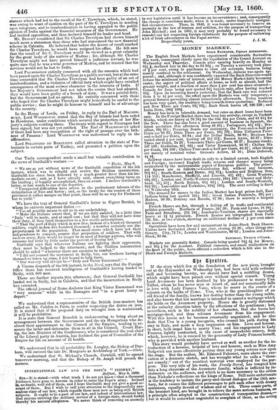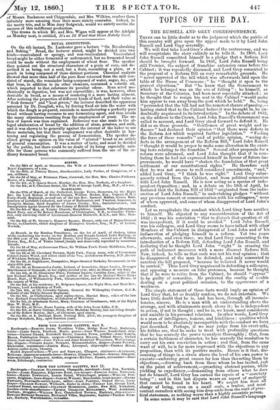tOtatrts.
If the story which lies at the foundation of the new piece, brought out at the Haymarket on Wednesday last, had been told with ordinary skill and becoming brevity, we should have had a middling drama, which might have been passed over without special remark. Young Lord Avonmore has been destined by his predecessor to marry Una Talbot, whom he has never seen or heard of, and not unnaturally falls in love with Lady Frances Vane, whom he meets in the course of a sojourn on the banks of Como. Una, who is the granddaughter of an old friend of the family, knows her destiny better than the young noble, and also knows that her marriage is intended to cancel a mortgage which she holds on the Avonmore property. Hence she is greatly distressed at the unlucky direction taken by the affections of the gentleman ; but, neverthess, such is the nobility of her character, that she burns her mortgage-deed, and thus releases Avonmore from his engagement. With this heroic act he becomes eventually acquainted; and he also finds that Una is a young incognita, who crossed his path during his stay in Italy, and made a deep impression on him. Love and honour, in short, both impel him to marry Una ; and his engagement to Lady Frances, lightly contracted, is the cause of unspeakable misery, from which, however, he is rescued by the generosity of Lady Frances herself, who is provided with another husband.
This story would probably have served as well as another for the in- troduction of a heroine, brimful of love and honour, such as Miss Amy Sedgwick can more effectively portray than any young actress now upon the stage. But the author, Mr. Edmund Falconer, soars above the exe- cution of a dramatic sketch, and has wrought what he calls a "three- act comedy," out of the scantiest material ever employed for the pur- pose. The very title of his work, the Family Secret, has tempted him into a long ehroniale of the Avonmore family, which is inflicted by in- stalments on the audience, and which is no more necessary to the action than Niebuhr's reflections on the kings of Rome. Still more unfortunate is the tendency to imitate the parry-and-thrust dialogue of the 18th een- tury, for it causes the different personages to pelt each other with dreary sentences, equally devoid of wisdom and of wit. Three comic parts, of the broadest kind, are brought in to relieve the more serious business, on a principle often adopted in the construction of transpontine drama,— but it would be somewhat ungrateful to complain of these, as the acting
of Messrs. Buckstone and Chippendale, and Mrs. Wilkins, renders them infinitely more amusing than their more stately comrades. Indeed, to the merry trio, and to Miss Amy Sedgwick, would we entirly ascribe the success of this indifferent production. The drama in which Mr. and Mrs. Wigan will appear at the Adelphi on Monday next, is entitled, It's an III Wind that blows Nobody Good.



























 Previous page
Previous page